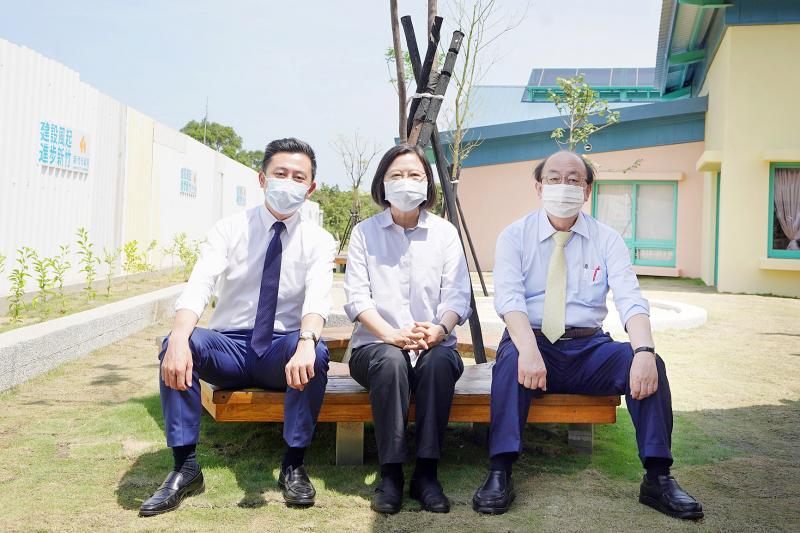Taiwan must secure a strategic position in the “new space age” and grasp the commercial opportunities heralded by low Earth orbit satellites, President Tsai Ing-wen (蔡英文) said yesterday.
The “new space age” refers to the increasing commercialization of space, with the private sector playing a more important role than national governments.
Tsai yesterday visited the headquarters of the National Space Organization (NSPO) at the Hsinchu Science Park along with Hsinchu Mayor Lin Chih-chien (林智堅).

Photo courtesy of the Hsinchu City Government
It is estimated that thousands of low Earth orbit satellites would be launched in the next decade, generating massive demand for satellite and ground equipment manufacturing, Tsai said.
The next decade is very crucial as many nations are also planning to return to the moon and Taiwan must secure a more strategically significant position in the “new space age,” she said.
Building on Taiwan’s strengths in semiconductors and precision manufacturing, the Ministry of Science and Technology and the National Development Fund are cooperating with local firms to try to grab a share of the global supply chain, she added.
Tsai expressed the hope that NSPO Director-General Wu Jong-shinn (吳宗信), nicknamed “Uncle Rocket,” would be able to “rocket” local space technology into space.
After Wu assumed his position on Aug. 2 he has been restructuring the NSPO to highlight the development of satellite payloads, components and avionics.
Asked about his rationale, Wu said that the NSPO in earlier years had to purchase many components from foreign suppliers when developing a satellite.
The lack of autonomous development of certain components caused uncertainty about their import and delayed satellite development, he said.
Following the restructuring, the NSPO would be able to devote more resources to developing satellite payloads and components, Wu said.
The flight control division and electrical engineering division have been merged into a new satellite avionics division, he said.
Speaking about the NSPO’s plans, Wu said weather satellite Triton (獵風者) is scheduled to be launched next year and it also plans to develop a second low Earth orbit communications satellite for the Beyond 5G project, set to be launched in 2025 or 2026.
The Beyond 5G project only consisted of one satellite when it was initiated by the Ministry of Science and Technology in January with a budget of NT$4 billion (US$144.3 million).
The specifications of the two B5G communications satellites would be comparable to those of the Starlink satellites developed by SpaceX, Wu said.
Asked whether there would be more funding to produce satellites, Executive Yuan Board of Science and Technology Executive Secretary Andrew Yeh (葉哲良) said that more deliberation is needed and that the results would be known by the end of this year.

SECURITY: As China is ‘reshaping’ Hong Kong’s population, Taiwan must raise the eligibility threshold for applications from Hong Kongers, Chiu Chui-cheng said When Hong Kong and Macau citizens apply for residency in Taiwan, it would be under a new category that includes a “national security observation period,” Mainland Affairs Council (MAC) Minister Chiu Chui-cheng (邱垂正) said yesterday. President William Lai (賴清德) on March 13 announced 17 strategies to counter China’s aggression toward Taiwan, including incorporating national security considerations into the review process for residency applications from Hong Kong and Macau citizens. The situation in Hong Kong is constantly changing, Chiu said to media yesterday on the sidelines of the Taipei Technology Run hosted by the Taipei Neihu Technology Park Development Association. With

CARROT AND STICK: While unrelenting in its military threats, China attracted nearly 40,000 Taiwanese to over 400 business events last year Nearly 40,000 Taiwanese last year joined industry events in China, such as conferences and trade fairs, supported by the Chinese government, a study showed yesterday, as Beijing ramps up a charm offensive toward Taipei alongside military pressure. China has long taken a carrot-and-stick approach to Taiwan, threatening it with the prospect of military action while reaching out to those it believes are amenable to Beijing’s point of view. Taiwanese security officials are wary of what they see as Beijing’s influence campaigns to sway public opinion after Taipei and Beijing gradually resumed travel links halted by the COVID-19 pandemic, but the scale of

A US Marine Corps regiment equipped with Naval Strike Missiles (NSM) is set to participate in the upcoming Balikatan 25 exercise in the Luzon Strait, marking the system’s first-ever deployment in the Philippines. US and Philippine officials have separately confirmed that the Navy Marine Expeditionary Ship Interdiction System (NMESIS) — the mobile launch platform for the Naval Strike Missile — would take part in the joint exercise. The missiles are being deployed to “a strategic first island chain chokepoint” in the waters between Taiwan proper and the Philippines, US-based Naval News reported. “The Luzon Strait and Bashi Channel represent a critical access

Pope Francis is be laid to rest on Saturday after lying in state for three days in St Peter’s Basilica, where the faithful are expected to flock to pay their respects to history’s first Latin American pontiff. The cardinals met yesterday in the Vatican’s synod hall to chart the next steps before a conclave begins to choose Francis’ successor, as condolences poured in from around the world. According to current norms, the conclave must begin between May 5 and 10. The cardinals set the funeral for Saturday at 10am in St Peter’s Square, to be celebrated by the dean of the College